ICT & Human Rights Panel at IADIS
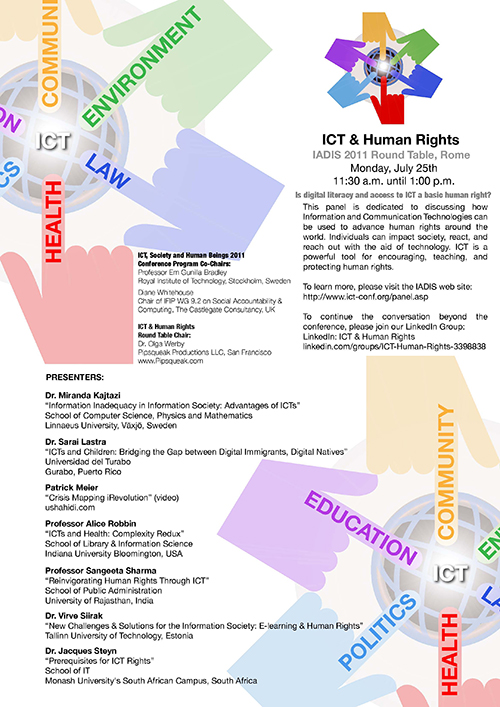
The presenters in attendance, in order of presentation:
- Professor Sangeeta Sharma
Title of presentation: Reinvigorating Human Rights Through ICT
School of Public Administration
University of Rajasthan, India - Professor Alice Robbin
Title of presentation: ICTs and Health: Complexity Redux
Indiana University Bloomington - Dr. Sarai Lastra
Title of presentation: ICTs and Children: Bridging the Gap between Digital Immigrants, Digital Natives
Universidad del Turabo
Gurabo, Puerto Rico - Dr. Miranda Kajtazi
Title of presentation: Information Inadequacy in Information Society: advantages of ICTs
School of Computer Science, Physics and Mathematics
Linnaeus University, Växjö, Sweden - Dr. Jacques Steyn
Title of presentation: Prerequisites for ICT Rights
School of IT
Monash South Africa
Patrick Meier and Dr. Virve Siirak were unable to attend in person. I summarized Patrick’s work in my opening statement and I hope Dr. Siirak would comment on his work below or on our LinkedIn community (ICT & Human Rights—all are welcome to join our open group).
Opening Statement
I chose to introduce each subtopic of the panel as part of my opening statement and to give it a slightly unusual take for each topic. Below are my notes and I’ve posted the PDF of my KeyNote on LinkedIn.
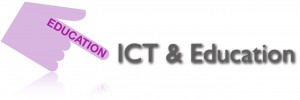
“Education is the most powerful weapon which you can use to change the world.“—Nelson Mandela
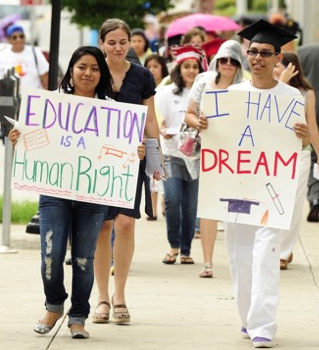 There has a lot of research on the use ICT in education and much is being said on the subject. ICT allows access to education for groups that previously had very little: for individuals that were born in a “wrong” geographic location and lacking access due to where they live; for people with learning and physical disabilities who couldn’t manage within the walls of a regular classroom; for those deemed too old or too young to learn; for groups that were labeled unworthy of education… ICT opened access to learning opportunities.
There has a lot of research on the use ICT in education and much is being said on the subject. ICT allows access to education for groups that previously had very little: for individuals that were born in a “wrong” geographic location and lacking access due to where they live; for people with learning and physical disabilities who couldn’t manage within the walls of a regular classroom; for those deemed too old or too young to learn; for groups that were labeled unworthy of education… ICT opened access to learning opportunities.
But there are consequences of ICT in education that are not as rosy as the ones most mentioned in research and the media. For example, while online education expands opportunities for some, it can also be used to reduce the educational budget for an organization or a government. We are seeing proposal to use online learning in kindergarten. These proposals are there to reduce the cost of providing education, the benefits to children are an afterthought.
Another point is best made by Dr. Merridy Wilson, professor at University of the Witwatersrand, South Africa.
“Assumptions about the need for a transfer of knowledge for development purposes are central within the ICT and development discourse and
justify the existence of a category of people known as the ʻinformation-poorʼ or ʻknowledge-poorʼ. … Assuming that people are ʻinformation-poorʼ because they do not have access to the specific forms of information that are made available
through ICTs, devalues the information and the knowledge that these people do have.“—Merridy Wilson
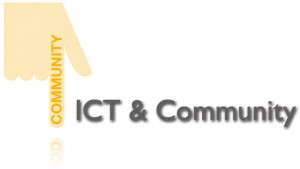
“To live is to choose. But to choose well, you must know who you are and what you stand for, where you want to go and why you want to get there.“—Kofi Annan
I was hoping that Patrick Meier would join us for the panel, but in his absence, I told the audience about Ushahidi’s role in the 2010 Haiti Earthquake. Fortunately, Ushahidi created a video that explained the role it played in saving lives on the ground and how Crisis Mapping is changing the world.
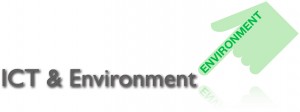
“Education is a human right with immense power to transform. On its foundation rest the cornerstones of freedom, democracy and sustainable human development.“—Kofi Annan
 The science of environmental changes as caused by human activity is very complex. There’s a lot of misinformation floating around, and ICT helps spread both the myths and the truth. One of the most powerful tools that ICT has is the ability to easily share visual information. It’s one thing to talk about pollution, for example, it’s quite another to see an image of hundreds of pounds of discarded drugs littering the landscape in China (see the photo).
The science of environmental changes as caused by human activity is very complex. There’s a lot of misinformation floating around, and ICT helps spread both the myths and the truth. One of the most powerful tools that ICT has is the ability to easily share visual information. It’s one thing to talk about pollution, for example, it’s quite another to see an image of hundreds of pounds of discarded drugs littering the landscape in China (see the photo).
Satellite imagery of before and after, showing the sever shrinkage of the rain forests in the Amazon, are calls to action. They give concrete representations of abstract ideas. Their educational potentials can have a real environmental impact.
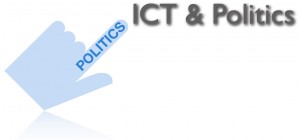
“The control of information is something the elite always does, particularly in a despotic form of government. Information, knowledge, is power. If you can control information, you can control people.“—Tom Clancy
In 2008, we saw the first Web 2.0 Election: Obama reached out to his supporters through social media and ICT. He used email, he posted updates with text messages. He was the first presidential candidate with an “addiction” to his PDA.
In the last year, we’ve seen how information control turned into ICT control. Egypt, Sudan, China, all used Internet restrictions to control their citizens. The United Nations has proposed that Internet access should be a human right.
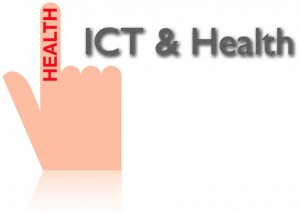
“While health-on-the-web may empower in various ways those who have access to the internet, the flip side of this is that those without internet access may
become relatively more disadvantaged in health matters. For them, the experience may be more one of disempowerment through inability to take advantage of new opportunities.“—Europe’s Digital Competitiveness Report 2010
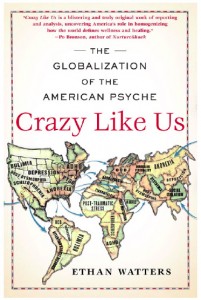 As with education, ICT and health is a well-discussed topic. So to add controversy, I will focus on the downsides of ICT and health.
As with education, ICT and health is a well-discussed topic. So to add controversy, I will focus on the downsides of ICT and health.
The Homogenization of Cultural Differences of Symptoms: Health Care Providers
ICT allows individuals to erroneously conclude that the best course of action for another person is based solely on how they feel about it or how they would act in the same situation. The result was the unprecedented move by the world’s mental health professionals to aide the victims of 2004 tsunami. Hundreds of therapists
descended on on Indonesian villagers offering Post Traumatic Stress Disorder services. Very few who went understood the local culture or how this population was accustomed to dealing with tragedies. This was a classic example of Mirroring Error and cultural bias.
The Homogenization of Cultural Differences of Symptoms: Patients
ICT allows individuals to adapt the pathology they’ve found in other cultures, developing the symptoms they’ve read about on the Web. Thus for example, Anorexia, which was virtually unknown in the Eastern cultures before 1980s, is fast
becoming as prevalent as it is in the West. “Ten years ago, we saw only one or two anorexics each year,” says Dr. Sing Lee, a psychiatrist at The Chinese University of Hong Kong (2007). “Now, we see one new patient a month. Many are hospitalized.”
For an gripping account of some of these changes, please read “Crazy Like Us” by Ethan Watters.
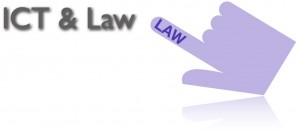
“Ignorance of the law excuses no man…“—John Selden
“Aequitas sequitur legem.” Equity follows the law.
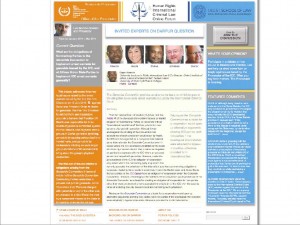 As an example of changes brought on by ICT in the legal landscape of our society, I briefly introduced the IADIS audience to the UCLALawForum. For a full presentation on the Forum, please visit LinkedIn, where I’ve posted my presentation from the “Advancing the New Machine” conference, hosted by the UC Berkeley Human Rights Center this last April. Or read about it here on this blog.
As an example of changes brought on by ICT in the legal landscape of our society, I briefly introduced the IADIS audience to the UCLALawForum. For a full presentation on the Forum, please visit LinkedIn, where I’ve posted my presentation from the “Advancing the New Machine” conference, hosted by the UC Berkeley Human Rights Center this last April. Or read about it here on this blog.
Below is a quote from an interview with International Criminal Court Prosecutor on the charges filed against General Gaddafi.
“Facebook triggered a very quick reaction. The (United Nations) Security Council reacted in a few days; the U.N. General Assembly reacted in a few days. … I think Libya is a new world.“—Luis Moreno-Ocampo
Reinvigorating Human Rights Through ICT
The introduction to the panel and the role of ICTs and human rights in our societies was given by Professor Sangeeta Sharma. She strongly urged a dialog centered on human rights and was truly the heart of the conference.
ICTs and Health: Complexity Redux
Professor Alice Robbin brought her expertise on the ICT and health. She pointed out a shift in a responsibility from doctors to patients that requires regular non-experts individuals to take control of their health without the necessary background to do so effectively (or even safely). This is clearly problematic and will require some policy changes to create ways to support the patients and provide them with educational opportunities and supports to make what may well be life or death decisions.
She also noticed a pattern of publication in the scientific journals. Professor Robbin’s pointed out that journals only publish “successes”. Since we learn from both success and failure, I hope there will be some changes in a near future in at least some of the publications she mentioned.
Bridging the Gap between Digital Immigrants, Digital Natives
Dr. Sarai Lastra took up the issue of the digital divide and its impact on education and learning communities. In particular, I find her insight into the “loose” use of technical vocabulary particularly interesting. I think we might all be guilty of creating terms and using them without a firm definition. Some terms are particularly fun to use (e.g. “webigrants” was used in one presentation at the IADIS conference) and can be appropriated by the government agencies without a clear understanding of the ideas and theoretical foundations. I agreed with her that this can lead to poor public policy by inadvertently creeping up in governmental discourse.
Information Inadequacy in Information Society: advantages of ICTs
Dr. Miranda Kajtazi questioned the value of information—it’s need to be just-in-time and relevant. This is exactly to the point. The giant hose of data that drenches each us would be best replaced by carefully targeted information that we can fine-tune to our particular needs. I think this is an area of very productive research and those who can tackle this problem, would do very well (both academically and financially).
Prerequisites for ICT Rights
Dr. Jacques Steyn gave a wonderful closing argument to our panel! A great closer! I was anticipating it the whole time, since I was privy to his advanced summary for the presentation.
Dr. Steyn asks these questions: “WHAT RIGHT? FUNCTION OR TOOL? HOW ADVANCED A TOOL? WHO BUYS IT FOR THOSE WHO COULDN’T DO SO THEMSELVES? WHOSE RIGHTS, INDIVIDUALS OR COMMUNITIES?” He also discussed the difference between passive rights and active rights—active rights require that those who can provide for those who can’t do so themselves.
Here’s a quote: “Why is a particular technology, popular at a particular temporal slice in history typically used as the technology which should serve as a right? Dialogue seems to be confusing function and tool on one hand, and with regard to the tool, seemingly and tacitly arguing for only one among many ICT technologies. A discussion on ICT rights should demarcate which tools are to be included, which not, or which subsets, or whether all such tools should be included. Such discussion is absent.”
I was thinking about Dr. Steyn’s arguments. I believe what we are all talking about it is the access to information and the ability to communicate freely. I think these are the human rights that we discussing as worth protecting. All of the subjects mentioned at the conference had to do with access to some sort of information: legal, political, medical, educational… It doesn’t matter what the delivery mechanism is, it’s just the access that counts. Internet is where we as a civilization have been storing our information, and so access to this has to be a human right—access to the wealth of human knowledge. Books served this purpose before…
The opposite is also true—the ability to contribute to the human knowledge has to be a human right (and all that this implies). Bill Gates talks about the mission of his non-profit—to allow each individual to contribute to our civilization to the best of his/her ability. He is doing so by improving health and educational opportunities. “To live a productive life.”—that’s the goal for all of us. A human right?
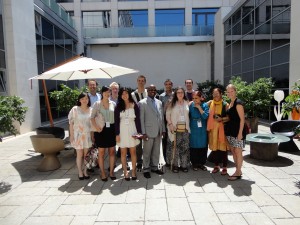
Above is a group photo from the conference on eDemocracy (thank you Iva Walterová).

3 comments for “ICT & Human Rights Conference Notes and Thoughts”